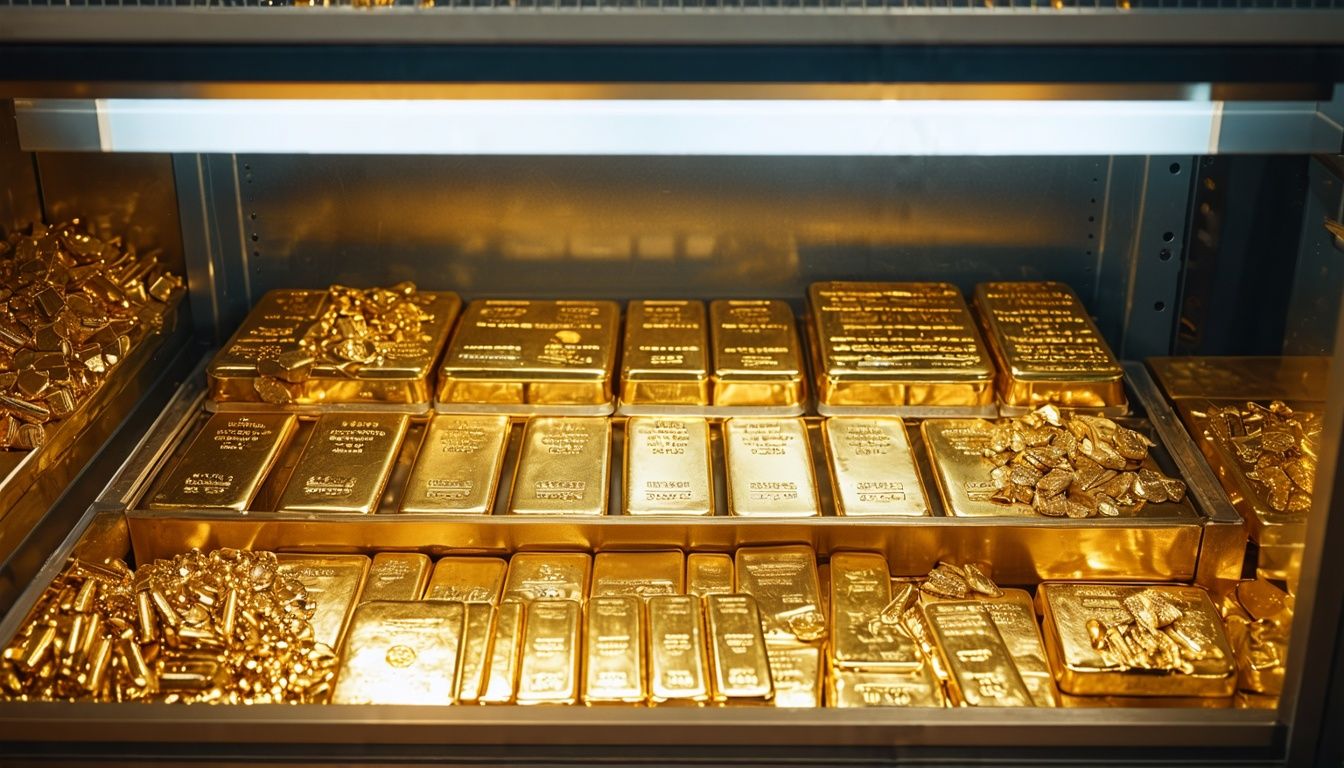Gold Roth IRA
#1 Gold Roth IRA for Precious Metal Investments
Discover all the info for finding the best gold Roth IRA investments to diversify your portfolio!
Gold Roth IRA
Gold Investments
Rare Coins
Invest in Coins
Precious Metals
Gold, Silver and More!
Rollover IRA
Rollover your Investments
Gold Roth IRA: Best Gold IRA For Precious Metal Investments

Are you worried about securing your retirement in an uncertain economy? Gold IRAs have gained popularity as a way to diversify retirement savings. This article will explain how Gold Roth IRAs work and their benefits for precious metal investments.
Ready to learn more about safeguarding your future?
Key Takeaways
- Gold Roth IRAs allow investors to hold physical gold and other precious metals in their retirement accounts, offering a way to diversify portfolios and hedge against economic uncertainty.
- For 2023, you can contribute up to $6,500 to a Gold IRA, with an extra $1,000 allowed if you’re 50 or older. This limit increases to $7,000 in 2024.
- Top Gold IRA companies like JM Bullion, Silver Gold Bull, and Birch Gold Group offer services to help investors set up and manage their precious metal IRAs.
- Gold IRAs come with higher fees than traditional IRAs due to storage and management costs, and the IRS requires the gold to be held by an approved custodian.
- Alternatives to Gold IRAs include investing in gold ETFs, mutual funds, or mining stocks through a traditional IRA, which may offer easier management and lower fees.
Understanding Gold IRAs

Gold IRAs offer a unique way to diversify retirement savings. They let investors hold physical gold and other precious metals in their retirement accounts.
What is a Gold IRA?
A Gold IRA is a specialized individual retirement account that allows investors to hold physical gold and other precious metals. It functions like a traditional or Roth IRA, but instead of paper assets, it contains IRS-approved gold coins, bars, or bullion.
These accounts offer a unique way to diversify retirement portfolios and hedge against economic uncertainties.
Setting up a Gold IRA requires working with a custodian who specializes in precious metal IRAs. The custodian handles the purchase, storage, and sale of the gold on behalf of the account holder.
While Gold IRAs can provide protection against inflation and currency fluctuations, they also come with specific rules and considerations, such as storage requirements and potential fees.
A Gold IRA serves as a tangible safeguard for your retirement nest egg, offering a shield against market volatility and economic instability.
Types of Gold IRAs

Building on our understanding of Gold IRAs, let’s explore the different types available. Gold IRAs come in three main flavors: Traditional, Roth, and SEP. Each offers unique tax benefits and suits different investor needs.
Traditional Gold IRAs use pre-tax dollars, allowing you to defer taxes until withdrawal. Roth Gold IRAs, funded with after-tax money, offer tax-free growth and withdrawals in retirement.
SEP Gold IRAs cater to small business owners and self-employed individuals, providing higher contribution limits. For 2023, you can put up to $6,500 into your Gold IRA, with an extra $1,000 if you’re 50 or older.
In 2024, this limit jumps to $7,000. Remember, these accounts must be kept separate from other IRAs. Beyond physical gold, you can also invest in gold-related paper assets like ETFs, stocks, and commodity futures within your Gold IRA.
Risks of Gold IRAs
After understanding the types of Gold IRAs, it’s crucial to grasp the risks involved. Gold IRAs come with their own set of challenges. The fees for these accounts often surpass those of standard IRAs due to the costs of buying and storing precious metals.
Gold prices can be unpredictable, leading to potential losses. There’s also the risk of theft or fraud, especially if the gold is stored improperly.
Unlike stocks or bonds, gold doesn’t pay dividends or yield returns to its owner. This lack of passive income can impact long-term growth. It’s rare for a gold IRA to outperform other retirement investments over time.
Investors should weigh these factors carefully before committing their retirement funds to a gold IRA.
Considerations Before Investing
Moving from the risks associated with Gold IRAs, it’s crucial to weigh several factors before diving into this investment. Investors should carefully evaluate their financial goals, risk tolerance, and retirement timeline.
Gold IRAs often come with higher fees compared to traditional retirement accounts, potentially eating into returns. These costs include setup fees, storage charges, and management expenses.
Diversification remains key – experts recommend allocating no more than 5-10% of a portfolio to precious metals. IRS guidelines dictate strict rules on eligible metals, purity standards, and approved storage facilities.
Seeking advice from a financial advisor can help navigate these complexities and determine if a Gold IRA aligns with your overall retirement strategy. Remember, contribution limits apply: $6,500 in 2023 and $7,000 in 2024, with an extra $1,000 allowed for those 50 and older.
Benefits of a Gold IRA
Gold IRAs offer unique advantages for retirement planning. They provide a hedge against economic uncertainty and market volatility, which can protect your savings during financial downturns.
Diversification is key – experts recommend allocating a small portion of retirement assets to gold IRAs. This strategy can help balance your portfolio and potentially reduce overall risk.
Gold’s historical performance speaks volumes. After the 2008 financial crisis, gold prices soared past $2,000 per ounce. This demonstrates its potential as a safe haven during turbulent times.
For those looking to safeguard their retirement funds, a gold IRA might be worth considering. Let’s explore how to set up a gold IRA account.
Setting Up a Gold IRA
Setting up a Gold IRA requires careful planning and expert guidance. You’ll need to choose a reputable company, open an account, and select a custodian to manage your precious metal investments.
How to Choose a Gold IRA Company
Selecting a gold IRA company requires careful consideration and research. Here’s a guide to help you choose the right provider for your precious metal investments:
- Reputation and track record: Look for companies with a solid history in the industry. Check their Better Business Bureau (BBB) rating – aim for those with an “A” grade or higher.
- Fees and pricing: Compare costs across different providers. Be aware that gold IRA companies often charge fees above the average market price for gold.
- Minimum investment requirements: Evaluate initial purchase requirements and account minimums. Avoid companies with purchase requirements over $20,000.
- Product offerings: Ensure the company offers a variety of IRS-approved precious metals, including gold bars, coins, and other bullion options.
- Storage options: Verify that the company partners with IRS-approved depositories for secure storage of your precious metals.
- Buyback program: Check if the company offers a fair buyback program for when you want to sell your gold or other precious metals.
- Customer service: Assess the quality of customer support. Look for companies that provide educational resources and responsive assistance.
- Transparency: Choose a provider that clearly discloses all fees, policies, and procedures upfront.
- Rollover assistance: If you’re planning to roll over an existing retirement account, select a company that offers guidance through this process.
- Custodian partnerships: Ensure the company works with reputable IRA custodians who specialize in self-directed precious metals IRAs.
- Insurance coverage: Confirm that the storage facility used by the company provides adequate insurance for your investments.
- Compliance with IRS regulations: Verify that the company adheres to all IRS rules regarding precious metals IRAs.
- Educational resources: Opt for a provider that offers comprehensive learning materials about gold IRAs and precious metal investing.
- Account management tools: Consider companies that provide user-friendly online platforms for managing your gold IRA.
- Delivery options: If you plan to take physical possession of your gold at some point, check the company’s policies on home delivery.
Opening a Gold IRA Account
Opening a Gold IRA account is a straightforward process with the right guidance. Let’s explore the key steps to get your precious metal investment journey started:
- Choose a reputable custodian: Look for firms specializing in self-directed IRAs that allow precious metals. Research their track record, fees, and customer service.
- Complete paperwork: Fill out the necessary forms to open your account. This typically includes personal information and beneficiary designations.
- Fund your account: Transfer funds from an existing IRA or 401(k), or make a new contribution. The 2023 limit is $6,500, increasing to $7,000 in 2024.
- Select your metals: Decide which IRS-approved precious metals to invest in. Options include gold, silver, platinum, and palladium coins or bars.
- Place your order: Work with your custodian to purchase the chosen metals from a dealer they partner with.
- Arrange secure storage: Your gold must be held at an IRS-approved facility. Your custodian will handle this, ensuring your investment is safe and compliant.
- Monitor your investment: Keep track of your account’s performance and make adjustments as needed to align with your financial goals.
- Stay informed about regulations: Gold IRAs are subject to specific rules. Stay updated on contribution limits, required minimum distributions, and tax implications.
- Consider diversification: While focusing on gold, explore other precious metals or traditional investments to spread risk within your IRA.
- Plan for the long term: Gold IRAs are designed for retirement savings. Develop a strategy that aligns with your retirement timeline and financial objectives.
Gold IRA Custodians
After opening a Gold IRA account, you’ll need a custodian to manage and store your precious metals. These specialized firms ensure your investment complies with IRS regulations. Unlike traditional brokers, Gold IRA custodians have the expertise to handle physical gold and other approved metals.
Companies like American Bullion, APMEX, JM Bullion, and Silver Gold Bull offer custodial services for Gold IRAs. They safeguard your assets in secure vaults and handle the paperwork required by tax authorities.
Choosing a reputable custodian is crucial – they’ll be responsible for maintaining your retirement nest egg in line with federal guidelines.
Gold IRA Rollover
Gold IRA rollovers offer a way to diversify retirement portfolios with precious metals. This process involves transferring funds from an existing retirement account into a new Gold IRA.
- Eligibility: Most retirement accounts qualify for rollovers, including Traditional IRAs, 401(k)s, and 403(b)s. Check with your current plan administrator to confirm eligibility.
- 60-day rule: Complete the rollover within 60 days to avoid taxes and penalties. The IRS strictly enforces this deadline for all Gold IRA transfers.
- Direct vs. indirect rollovers: Direct rollovers involve a custodian-to-custodian transfer. Indirect rollovers put the funds in your hands temporarily before depositing them into the new account.
- Contribution limits: Gold IRA rollovers don’t count toward annual contribution caps. You can move larger sums without affecting your yearly $6,500 (2023) or $7,000 (2024) limit.
- Tax implications: Traditional IRA to Gold IRA rollovers maintain tax-deferred status. Roth IRA to Gold IRA transfers keep their tax-free growth potential.
- Custodian selection: Choose a reputable custodian specializing in precious metals IRAs. They’ll handle the paperwork and ensure IRS compliance.
- Approved metals: The IRS allows specific gold, silver, platinum, and palladium products in Gold IRAs. American Gold Eagle coins are a popular choice.
- Storage requirements: Your Gold IRA metals must be stored in an IRS-approved depository. Home storage isn’t permitted for these assets.
- Fees: Expect setup fees, annual maintenance charges, and storage costs. Compare providers to find competitive rates without sacrificing service quality.
- Diversification benefits: Gold IRAs can act as a hedge against inflation and economic uncertainty. They provide portfolio balance alongside traditional stocks and bonds.
Alternatives to Gold IRAs
Investors seeking precious metal exposure have options beyond Gold IRAs. Here’s a look at some alternatives that offer similar benefits without the complexities of a specialized retirement account:
- Gold Mutual Funds: These professionally managed funds invest in gold-related stocks or physical gold. They provide diversification and liquidity without the need for storage or custodian fees.
- Gold Exchange-Traded Funds (ETFs): ETFs track the price of gold, offering easy trading on stock exchanges. They’re cost-effective and don’t require physical storage of gold.
- Gold Mining Stocks: Investing in companies that extract gold can provide leverage to gold prices. These stocks may offer dividends and growth potential beyond just the metal’s value.
- Physical Gold Outside an IRA: Buying gold coins or bars directly allows for personal possession and avoids IRA restrictions. This option offers flexibility but lacks tax advantages.
- Gold Futures and Options: These derivative contracts allow investors to speculate on gold prices or hedge existing positions. They’re more complex but can offer significant returns.
- Gold Certificates: Issued by banks, these represent ownership of gold without physical possession. They’re easy to trade but rely on the issuer’s credibility.
- Gold Savings Accounts: Some banks offer accounts denominated in gold, allowing savers to accumulate gold over time without storage concerns.
- Gold-Backed Cryptocurrencies: Digital tokens backed by physical gold combine modern technology with traditional precious metal investments.
- Checkbook IRA for American Eagles: This self-directed IRA structure allows personal possession of certain gold coins, bridging the gap between IRAs and direct ownership.
- Gold-Linked Bonds: These debt securities offer returns tied to gold prices, providing exposure without direct ownership.
Best Gold IRA Companies

Choosing the right gold IRA company is crucial for your investment success. We’ve researched and compared top firms to help you make an informed decision.
JM Bullion
JM Bullion stands out as a top-tier gold IRA provider. They offer a wide range of IRA-approved precious metals, including gold American Eagles and silver Canadian Maples. Their no-minimum purchase policy makes it easier for investors to start small and grow their portfolios over time.
JM Bullion’s partnership with self-directed IRA custodians simplifies the process of setting up new IRAs for clients.
Secure storage is a key feature of JM Bullion’s service. They provide depository vaulting options in Las Vegas, Nevada, and Dallas, Texas. This gives investors peace of mind knowing their precious metals are safely stored in regulated facilities.
The next company on our list of best gold IRA providers is Silver Gold Bull.
Silver Gold Bull
Silver Gold Bull stands out in the gold IRA market. This company offers no minimum purchase requirement and provides solid customer service. Investors appreciate the flexibility to buy precious metals using credit cards.
Plus, Silver Gold Bull’s price match guarantee ensures competitive rates for IRA-approved gold, silver, and other metals.
Silver Gold Bull’s recent growth is noteworthy. In 2024, A-Mark Precious Metals, Inc. increased its stake in the company by 8%. This move signals confidence in Silver Gold Bull’s business model and future prospects.
For those looking to diversify their retirement portfolio with physical precious metals, Silver Gold Bull presents an accessible and customer-friendly option.
Birch Gold Group
Birch Gold Group stands out as a top-tier gold IRA company. They offer expert guidance and partner with industry-leading custodians to ensure a smooth investment process. Their services include a variety of IRA-eligible gold coins, rounds, and bars – perfect for diversifying retirement portfolios.
Investors can get started with a $10,000 initial purchase, though it’s worth noting the high gold bar spread.
For those curious about gold IRAs, Birch Gold Group provides free 2024 information kits. These kits break down the ins and outs of precious metal investments in clear, simple terms.
Whether you’re new to gold IRAs or looking to expand your holdings, Birch Gold Group aims to make the process straightforward and tailored to your financial goals.
How Does a Gold IRA Work?
Gold IRAs function as specialized retirement accounts that let you hold physical precious metals. Unlike traditional IRAs, these accounts store actual gold bars, coins, or other approved metals in secure vaults.
You can’t keep the gold at home – it must be held by an IRS-approved custodian. The process starts with opening an account through a reputable gold IRA company. You then fund it by transferring money from an existing retirement account or making new contributions.
The custodian uses those funds to purchase gold on your behalf and stores it securely.
The value of your Gold IRA fluctuates with the price of gold, offering potential for growth. As with other IRAs, you can make tax-deductible contributions and enjoy tax-deferred growth.
At retirement age, you can take distributions in cash or request delivery of your physical gold. Gold IRAs provide a way to diversify retirement savings and potentially hedge against economic uncertainty.
But they also come with unique risks and fees to consider.
Gold IRA vs. Physical Gold: Pros and Cons
Investors often compare Gold IRAs and physical gold ownership. Each option has its own set of advantages and drawbacks.
| Gold IRA | Physical Gold |
| Pros:• Tax advantages• Professional storage• Easier to liquidate• Potential for higher returns | Pros:• Direct possession• No management fees• Privacy• Immediate access |
| Cons:• Higher fees• Less transparent costs• Limited control over storage• Stricter regulations | Cons:• Security risks• Storage concerns• No tax benefits• Potential authenticity issues |
Choosing between a Gold IRA and physical gold depends on individual financial goals and risk tolerance. The next section explores alternative ways to invest in gold through traditional IRAs.
Alternative Ways to Invest in Gold Through a Traditional IRA

Traditional IRAs offer several ways to gain exposure to gold without directly owning physical bullion. Investors can buy shares in gold mining companies, gold ETFs, or mutual funds that focus on precious metals.
These options provide the potential for gold-related returns while avoiding the storage and security concerns of physical gold.
For those seeking a more direct link to gold prices, some IRAs allow investment in gold futures contracts or options. These financial instruments track gold’s market value closely.
Yet, they require careful management and understanding of complex market dynamics. Always consult a financial advisor to determine the best gold investment strategy for your retirement goals and risk tolerance.
Conclusion
Gold Roth IRAs offer a unique way to diversify retirement savings with precious metals. They provide tax advantages and potential protection against economic uncertainties. Investors should carefully weigh the risks and benefits before opening an account.
Choosing a reputable custodian and understanding IRS regulations are crucial steps. With proper planning, a Gold Roth IRA can be a valuable addition to a well-rounded retirement strategy.
FAQs
1. What is a Gold Roth IRA?
A Gold Roth IRA is a self-directed individual retirement account that allows investors to hold physical gold and other precious metals. It offers tax-free growth and tax-free withdrawals during retirement, making it one of the best options for diversifying your portfolio with alternative investments.
2. How does investing in a Gold IRA differ from traditional IRAs?
Unlike traditional IRAs that typically invest in stocks and bonds, Gold IRAs allow you to hold gold bullion, coins, and other approved precious metals. This type of IRA must be held by a custodian bank or trust company that specializes in gold and precious metals investments.
3. Can I store the gold from my Gold IRA at home?
No, you can’t store the gold at home. IRS rules require that the actual physical gold must be held by an approved custodian. This ensures security and compliance with tax regulations. The custodian will store the gold in a secure facility, often in places like London or other major financial centers.
4. What types of gold can I invest in through a Gold IRA?
You can invest in various forms of gold, including American Gold Eagle bullion coins, gold bars, and rounds. The gold must meet certain fineness standards set by the IRS. Some IRAs also allow investment in other precious metals like silver and platinum coins.
5. Are there any risks associated with Gold IRAs?
Like all investments, Gold IRAs carry some risks. The price of gold can be volatile, affecting your returns. There are also fees for storage and management. It’s crucial to understand these risks and consult with a financial adviser before investing.
6. How do I open a Gold IRA?
To open a Gold IRA, you’ll need to choose a custodian that specializes in precious metals IRAs. You can then fund your account by transferring money from an existing IRA or making new contributions. After funding, you can select the gold products you want to buy through your custodian.